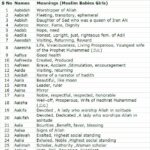Start With Bismillah
1. Bismillahir Rahmanir Rahim (In the name of Allah, the Most Gracious, the Most Merciful).
2. Islam is a monotheistic religion that originated in the 7th century CE.
3. There are five pillars of Islam that every Muslim must follow: Shahada (faith), Salah (prayer), Zakat (charity), Sawm (fasting), and Hajj (pilgrimage).
4. The holy book of Islam is called the Quran, which Muslims believe is the word of Allah revealed to Prophet Muhammad (peace be upon him) through the angel Gabriel.
5. Muslims believe in the concept of Tawheed, meaning the oneness of Allah, and reject any form of associating partners with Him (shirk).
6. Muslims strive to follow the teachings and example of Prophet Muhammad (peace be upon him), who is considered the last and final messenger of Allah.
7. Friday is considered the day of congregational worship in Islam, and Muslims are required to attend the Jummah prayer.
8. Muslims fast from dawn to sunset during the holy month of Ramadan, which involves refraining from food, drink, and certain activities as a means of purifying the soul and increasing self-discipline.
9. Muslims believe in the Day of Judgment, where Allah will resurrect all human beings and hold them accountable for their actions during their lifetime.
10. Paradise (Jannah) and Hellfire (Jahannam) are believed to be the eternal destinations in the afterlife based on one’s deeds in this world.
11. Muslims believe in predestination (Qadr), understanding that everything happens by the will and decree of Allah.
12. The Islamic calendar is based on the lunar calendar, consisting of 12 lunar months and being around 10-11 days shorter than the Gregorian calendar.
13. The call to prayer (Adhan) is made five times a day, reminding Muslims to turn their attention towards Allah and engage in Salah.
14. The Kaaba in Mecca, Saudi Arabia, is considered the holiest site in Islam and the direction (Qibla) towards which Muslims pray.
15. Jihad is often misunderstood; it means striving or struggling in the way of Allah, which can be both internal (striving against one’s own desires) and external (defending Islam or defending oneself).
16. Muslims believe in the equality of all human beings regardless of race, nationality, or socioeconomic status.
17. Islamic teachings encourage kindness, compassion, patience, and mercy towards all creations of Allah.
18. Islam promotes the importance of seeking knowledge, as the first verse revealed in the Quran commands: “Read, in the name of your Lord.”
19. Polygamy is allowed in Islam, with certain conditions and restrictions, but monogamy is the general practice.
20. Women in Islam have rights and responsibilities, including the right to education, work, and owning property. They are required to be treated with respect and dignity.
21. Modesty and decency in dress and behavior are emphasized for both men and women in Islam.
22. Muslims believe in the concept of Taqwa, which means God-consciousness, and it encourages ethical behavior and self-accountability.
23. Islamic finance follows principles which prohibit usury (riba) and encourage sharing profits and risks, as well as promoting ethical investments.
24. Muslims perform rituals such as ablution (Wudu) before prayer, which involves washing specific body parts in a specific order to attain purification.
25. Mosques serve as gathering places for Muslims to offer congregational prayers, seek Islamic knowledge, and participate in community activities.
26. Eid al-Fitr and Eid al-Adha are two major Islamic holidays celebrated worldwide, marking the end of Ramadan and commemorating the willingness of Prophet Ibrahim (Abraham) to sacrifice his son, respectively.
27. Muslims are encouraged to help the needy and give charity; the giving of a portion of one’s wealth (Zakat) is obligatory for those who reach a certain threshold.
28. The concept of Halal refers to what is permissible or lawful in Islam, encompassing food, drinks, slaughtering of animals, business transactions, and more.
29. Muslims perform a pilgrimage to the holy city of Mecca, known as Hajj, at least once in their lifetime if they have the physical and financial ability to do so.
30. Islam encourages dialogue, understanding, and peaceful coexistence between people of different faiths and beliefs.
More About Start With Bismillah
Starting any endeavor with the sacred phrase “Bismillah,” meaning “In the name of Allah,” sets the stage for a journey filled with blessings, gratitude, and spiritual alignment. This beautiful Arabic phrase not only carries immense religious significance but also holds profound wisdom that transcends boundaries of faith and culture. Whether embarking on a new project, pursuing personal goals, or simply starting the day, beginning with Bismillah allows us to acknowledge the divine presence, seek guidance, and find solace in knowing that we are not alone on this path of life.
In a world that often feels chaotic and overwhelming, starting with Bismillah becomes a reminder to pause, reflect, and connect with our innermost selves and the divine. Irrespective of our religious beliefs, this practice encourages us to approach life’s challenges with a mindset rooted in faith, hope, and gratitude. Bismillah directs our attention towards a higher power, whether we call it Allah, God, the Universe, or any other name we attribute to the divine source of creation.
Choosing to commence our journey with Bismillah demonstrates our recognition of the limited control we possess over life’s unfolding events. It signifies surrendering our ego and trusting in a higher purpose that guides and protects us through every step we take. By uttering Bismillah, we acknowledge that our efforts are not solely reliant on our own capabilities but are intertwined with the divine will, which encompasses all things in the universe.
Furthermore, beginning with Bismillah invites us to cultivate a state of mindfulness and awareness. It encourages us to be present in each moment, reflecting upon the intentions behind our actions and seeking alignment with our values and principles. By consciously incorporating this phrase into our daily routines, we develop a habit of intentional living, wherein we approach life’s choices and challenges with a greater sense of purpose and clarity.
The power of Bismillah also lies in its ability to infuse our endeavors with blessings and protection. When we embark upon a new venture, reciting Bismillah invites the divine intervention and blessings into our endeavors, creating a shield against negative influences and obstacles that may come our way. It serves as a reminder that success is not solely determined by worldly accomplishments but also by the spiritual growth and lessons we might encounter along the way.
Additionally, Bismillah serves as a unifying force, transcending religious, cultural, and linguistic barriers. Its message of seeking divine guidance and embracing the inherent goodness of all humanity resonates with people from various backgrounds. Regardless of our differences, starting with Bismillah encourages us to embark on our journeys with empathy, compassion, and love for one another.
In conclusion, beginning any endeavor with the auspicious phrase Bismillah sets the stage for a fulfilling, purposeful, and gratitude-filled journey. By acknowledging the divine presence, surrendering our egos, and seeking guidance, we empower ourselves to live a more mindful and intentional life. Regardless of our beliefs, Bismillah reminds us of the interconnectedness of all things and invites us to approach life’s challenges and opportunities with faith, hope, and gratitude. So, as we embark on our respective paths, let us remember the power behind these sacred words and find solace in starting with Bismillah.
Start With Bismillah FAQs:
Bismillah.
FAQ: Frequently Asked Questions
1. Q: What is the meaning of Bismillah?
A: Bismillah is an Arabic phrase that translates to “In the name of Allah.” It is commonly used by Muslims before starting any task or endeavor as a reminder of seeking Allah’s blessings and guidance.
2. Q: How many times is Bismillah mentioned in the Quran?
A: Bismillah appears at the beginning of all except one chapter (Surah At-Tawbah) in the Quran, which means it is mentioned 113 times.
3. Q: Can Bismillah be recited for non-religious tasks?
A: Yes, Muslims often recite Bismillah before performing various tasks like eating, drinking, studying, or starting any daily activity to seek Allah’s blessings, even if the task is not specifically religious.
4. Q: Is it necessary to say Bismillah aloud before starting a task?
A: It is not mandatory to say Bismillah out loud. Muslims can say it silently in their hearts before beginning any action or task.
5. Q: What is the significance of saying Bismillah before eating?
A: Saying Bismillah before eating is recommended in Islam as it acknowledges that food is a blessing from Allah and shows gratitude for His provisions.
6. Q: Can non-Muslims use the phrase Bismillah?
A: While non-Muslims are not prohibited from using the phrase, it is deeply rooted in Islamic faith and belief. Muslims consider it a sacred phrase and use it specifically in the context of their religious practices.
7. Q: Can Bismillah protect from harm or evil?
A: Bismillah is not a magical charm for protection; rather, it serves as a tool for Muslims to seek Allah’s blessings and put their trust in Him. It helps to remind believers to act righteously and seek guidance from Allah during all their endeavors.
8. Q: Can Bismillah be recited in any language besides Arabic?
A: The essence and meaning of Bismillah can be conveyed in any language while keeping the intent intact. However, the original Arabic phrase “Bismillah” holds greater spiritual significance for Muslims.
9. Q: Is reciting Bismillah a form of supplication or dua?
A: Reciting Bismillah is not a supplication or dua in itself. It is more of an introduction or mention of Allah’s name before starting an action. However, Muslims are encouraged to make specific supplications or duas for different occasions.
10. Q: Is there a specific etiquette for saying Bismillah?
A: There is no fixed etiquette for saying Bismillah, but it is recommended to say it with full attention and sincerity. Some Muslims prefer raising their hands or touching their fingertips to their lips while saying Bismillah for added reverence.

















